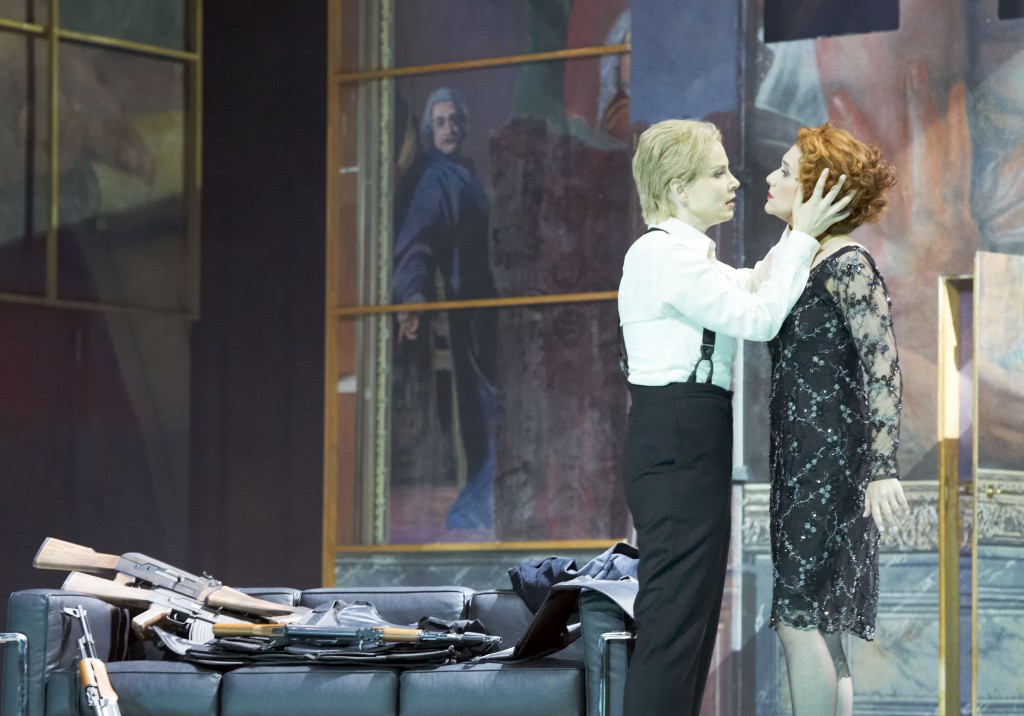 On the morning of the premiere of La Clemenza di Tito at Vienna State Opera, I happened to hear an interview on Austrian Radio with soprano Chen Reiss. Reiss is cast as Servilia, whom new Emperor Tito intends to marry (as a gesture of friendship to her brother Sesto).Servilia may seem a ‘small’ part, but Reiss contends, in opera roles are neither ‘short’ or ‘long’. Certainly Reiss, in a sparkling purple shift, had maximum impact in a relatively brief appearance in Act 1. Servilia refuses to accept Tito, though Annio is prepared to submit to the Emperor. In a tremendous aria she confirms her love for Annio: ‘Love is the only thing that truly matters in life’. Reiss’s’s powerful rendition is convincing enough to persuade Tito renounce his intention, and encourage the lovers.
On the morning of the premiere of La Clemenza di Tito at Vienna State Opera, I happened to hear an interview on Austrian Radio with soprano Chen Reiss. Reiss is cast as Servilia, whom new Emperor Tito intends to marry (as a gesture of friendship to her brother Sesto).Servilia may seem a ‘small’ part, but Reiss contends, in opera roles are neither ‘short’ or ‘long’. Certainly Reiss, in a sparkling purple shift, had maximum impact in a relatively brief appearance in Act 1. Servilia refuses to accept Tito, though Annio is prepared to submit to the Emperor. In a tremendous aria she confirms her love for Annio: ‘Love is the only thing that truly matters in life’. Reiss’s’s powerful rendition is convincing enough to persuade Tito renounce his intention, and encourage the lovers.
Reiss is one of a dazzling cast, inevitably eclipsed by the longer roles. Vitellia (Juliane Banse) is the daughter of the overthrown Emperor. Vitellia exploits Sesto’s love for her, offering her favours, should he join a conspiracy to kill Tito. Sesto (Sextus) is in fact played by mezzo Elina Garanca, and these two powerful singers vie for our applause, especially Garanca. As Tito, Michael Schade is refined, stylish, a rich, fulsome tenor. Tito is Mozart’s benevolent (‘Enlightened’) ruler , ‘the sole desire of the sovereign is to do good. The rest is torment’, he sings (to warm applause.)
Juliane Banse, red-haired, and a stunning presence in tight black lace dress (Versace inspired?), rages with passion, threatening the day Tito’s blood will run .’Is the Capital aflame yet’, she asks failed Sesto: ‘Get out of my sight!’ Sesto pleads, to a sublime clarinet accompaniment, let us part as friends. In a key aria, Garanca (cross-dressed) in a black waistcoat-trouser outfit, ballooning white shirt, insists ‘Look at me! I promise I will avenge you’. There was huge applause.
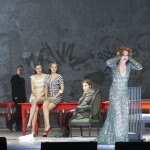 Banse’s Vitellia is also impressive (in a later aria) bemoaning her accursed rage, ill-fated fury. She feels great joy, but frozen with fright. The revolt begun, Vitellia tries to stop Sesto, who returns convinced he’s killed Tito. The Chorus come in, lamenting the death of the benevolent Emperor, lined up in black suits, with music stands and scores. ‘What a heinous crime. What a day of grief!’ (Sesto and Vitellia, meanwhile, sit disconsolately, side-by side on a chaise- longue.)
Banse’s Vitellia is also impressive (in a later aria) bemoaning her accursed rage, ill-fated fury. She feels great joy, but frozen with fright. The revolt begun, Vitellia tries to stop Sesto, who returns convinced he’s killed Tito. The Chorus come in, lamenting the death of the benevolent Emperor, lined up in black suits, with music stands and scores. ‘What a heinous crime. What a day of grief!’ (Sesto and Vitellia, meanwhile, sit disconsolately, side-by side on a chaise- longue.)
Act 2 opens to a messy stage with all sorts of props scattered about, like a trashed lounge, perhaps to symbolise Sesto’s chaotic state of mind? (Annio reports to the depressed Sesto, that the Emperor is unharmed). But Mozart’s music shines through the dry ice and Jurgen Flymm’s opaque direction (booed curtain-up.) To an oboe intro, Sesto sings of a gentle breeze caressing his face: this will be his last breath. In a magnificent group ensemble Sesto confesses. Vitellia urges him to flee , while the Chorus in the background ironically gives thanks for the saving of Tito. Annio ( mezzo Serena Malfi) advises Sesto to trust in Tito; though betrayed, and Sesto should die, the Emperor has a compassionate heart.
Tito is enraged: at first feels the villain must die, but relents, bemoaning the sad fate of the ruler torn between rage and friendship. In a dramatic scene, Sesto, prepared to die , will not reveal his secret. Nevertheless Tito, bemused, revokes the death sentence.
Mozart’s opera is about betrayal and loyalty. Schade, in black with a white cotton jacket- like a psychiatrist- appeals to Sesto to confide in his friend. Ultimately Sesto, remorseful, appeals to Tito’s frienship; Tito’s hostility is punishment enough to make him die an agonising death. Garanca’s performance won loud bravos.
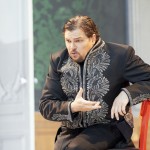 Tito knows Sesto is guilty, but if he ‘can only rule with a heart of steel, then take away my realm, or give me another heart. Loyalty means nothing if it is founded on fear, not love’, (Schade heavily applauded).
Tito knows Sesto is guilty, but if he ‘can only rule with a heart of steel, then take away my realm, or give me another heart. Loyalty means nothing if it is founded on fear, not love’, (Schade heavily applauded).
The message is that of the ‘Enlightened’ ruler. Mozart’s Tito is echoing the (eighteenth Century) Age of Enlightenment model of benevolent ruler. Schade is seen picking up scattered sheets of paper: are they manifestos?
It’s time for Vitellia- Banse again stunning- to prove her strength of character. She will go to to Tito and confess everything. Farewell her hopes of marriage (‘Never will the godess of marriage descend…’) And finally Sesto is led in blindfolded. The chorus behind him affirm ‘This day shows Tito a favourite of the gods.’ Vitellia is at his feet, admitting she neglected by him, sought revenge.
The closure of Mozart’s opera, though ‘drama seria’ resonnates with the reconciliation of ‘comedy’. Tito , betrayed by all, will not be avenged, but lets the conspirators go free. Tito bemoans the faithlessness of his subjects; but ‘Rome must know that he is omniscient, yet forgiving’.
Mozart’s ending is ambivalent. Sesto appears penitent: (‘Historical penitence is worth more than blemished loyalty’). Tito reaffirms Rome’s happiness is his supreme aspiration. Yet Mozart is a master of human psycholology. In the apparently conciliatory ending, the Chorus intone, ‘Protect him , oh eternal gods’,
This Vienna State Opera Cast was so good it’s hard to choose any one soloist , except for Garanca, who won on applause. Schade and Banse were impressive; also Malfi as Annio, and baritone Adam Plachetka’s Publio (Plachetka recently Figaro in House). It’s a shame, however, about the sets – hanging walls with collage-effect, vaguely period pastiche. Notwithstanding, high musical values prevailed. Louis Langree conducting a smaller, ‘period’ sized Vienna State Opera Orchestra, justified Mozart’s sublime music, eliciting outstanding, and sympathetic solos , especially from the woodwind section, (clarinet,oboe). Why, asked Chen Reiss, considering La Clemenza was such a hit (premiered 1791) is the opera so relatively neglected?
Those listening live on Austrian Radio would have heard an exemplary performance. Subsequent, different casts may attain these heights. Sadly, Vienna State Opera are stuck with George Tsypin’s flimsy, ramshackle, sub-standard sets.
17.05.2012
Photos: Elina Garanca (Sesto) and Juliane Banse (Vitellia); Juliane Banse (Vitellia) and Serena Malfi (Annio); Michael Schade (Tito)
(c) Wiener Staatsoper / Michael Pöhn
Monthly Archives: May 2012
Tannhauser
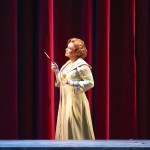
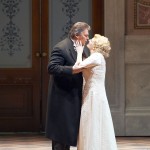
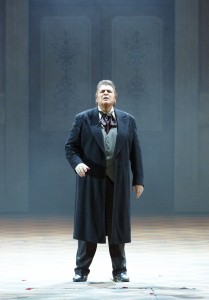 Vienna State Opera’s latest staging of Wagner’s Tannhäuser premiered in June 2010.
Vienna State Opera’s latest staging of Wagner’s Tannhäuser premiered in June 2010.
I was fortunate to experience new MD Franz Welser-Möst conducting a stellar cast, including Johan Botha as Tannhauser, and Christopher Gerhaher as Wolfram. So, my expectations were not great for Bertrand de Billy. After all, how can a Frenchman -even as distiguished as de Billy (Chief Vienna RSO 2002-2010)-compare with an Austrian, Welser-Möst, conducting Wagner? (In fact, de Billy debuted with Vienna State Opera in 1997, and has also conducted Fidelio, La Traviata, and Don Carlo this season.)
My expectations were exceeded and shameful prejudices were confounded. This was an exceptional performance which illuminated Wagner’s complex, mystifying, and at times mystical work. De Billy’s was a no-nonsense, rational approach to Wagner- eschewing the grandiose, and the thickening of Wagner’s orchestral textures with vibrato. I saw Christian Thielemann conducting The Ring (Siegfried)- Thielemann a massive presence, lounging luxuriantly, half-seated. De Billy, very slim and youthful , dressed in a business-like dark suit, was always standing, nimble, alertly responsive to his Vienna players. He’s modern and unpretentious. And de Billy goes for clarity, cutting through Wagnerian obfuscation.
First experiences of Wagner’s Tannhauser are of a work of infinite complexities. One cannot ever hope to fully understand it. I was at first too overwhelmed by the music, to really understand the ‘plot’, or come to terms with the work.
Tannhauser is the archetypal (nineteenth century) Romantic cult figure, hero and anti-hero, fraught by passionate emotions and longing; and ultimately consumed by conscience to face (problematically) a religious conversion, his soul redeemed. In the opening Act, he descends from Venusberg (Venus’s mountain), to confront Elisabeth, his betrothed, and to whom he’s been unfaithful. Act 2 puts Tannhauser – the Romantic outsider- in a wider social context. Tannhauser is measured up by the Landgrave (Elisabeth’s uncle). And he has to take part in a ‘Song contest’, where traditionally the men extol love as pure and chaste. Tannhauser, still intoxicated by Venus’s charms, antagonises his hosts by arguing love as pleasurable and licentious. Tannhauser’s life is saved by Elisabeth’s intervention. But he must serve penance, and is sent on a pilgrimage. The third Act shows Tannhauser still torn between the Spiritual and the Flesh, on his sickbed. He’s visited by Pilgrims, but still obsessed with the memory of ‘Venus’. Only Elisabeth’s devotion and love can persuade him to a religious conversion. Like Gounod’s Faust, the closure sweeps us up in a climax of religiosity. But whereas Gounod’s was Christian – the mid-19th century zeitgeist – Wagner’s is rather psychological/ spiritual, orgasmic love in death.
Claus Guth’s (controversial) sets are creative and imaginative in locating these scenes in late 19th century Vienna. How to convey the idea of Venusberg, if not as a bordello, or smart pick-up hotel as in Guth’s set? Act 2, using a re-creation of Vienna Staatsoper’s reception/foyer for Wartburg is witty, a self-reflexive mirror of (Viennese) Society. And Guth’s set uses Otto Wagner’s Hospital in Act 3 -as if Tannhauser were an inmate of a (progressive) mental asylum. Tannhauser’s state of mind is rather a sickness of the soul- a man consuming himself in his own passions and guilt. But Tannhauser has also revolted against decency, the mores of the time. His free-love, craving sexual appetite is revolutionary.
Nevertheless, the strength of de Billy’s production is in the casting of Peter Seiffert as Tannhauser. And its high point is in Act 3, in Seiffert’s depiction of Tannhauser as a soul in torment, and in conveying the power of his religious redemption. It is convincing in its spirituality.
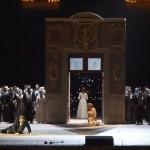 Seiffert as Tannhauser is a triumph. Highlights are, in Act 2, Tannhauser’s confession of his deeds, when he staggers, quaking, at the mercy of the Wartburg Assembly.( Elisabeth intercedes; she will be his judge.) With Seiffert, it all erupts, catches fire, in the marvelous choral singing of the climax to Act 2. Tannhhauser ‘cannot contradict heaven’s will’. He is sent on a pilgrimage- backed by a terrific ensemble and chorus, women’s choir behind him- ‘to Rome!’
Seiffert as Tannhauser is a triumph. Highlights are, in Act 2, Tannhauser’s confession of his deeds, when he staggers, quaking, at the mercy of the Wartburg Assembly.( Elisabeth intercedes; she will be his judge.) With Seiffert, it all erupts, catches fire, in the marvelous choral singing of the climax to Act 2. Tannhhauser ‘cannot contradict heaven’s will’. He is sent on a pilgrimage- backed by a terrific ensemble and chorus, women’s choir behind him- ‘to Rome!’
Seiffert is well up to the part. Act 1 demonstrated the technical power of his tenor. But Seiffert has reserves of passion – perhaps unsurpassed- to play the Romantic hero. He really acts, has the measure of Tannhauser. Seiffert sits curled up in a sort of purple dressing gown. He’s crushed with bitter anguish , bemoans having felt such evil lusts, tarrying in Venusberg. Seiffert slumped, making the sign of the cross; now jumps up, remembering Venus’s charms. But, his conscience asks, ‘Madman whom are you calling?’ Elisabeth enters; he’s drawn back to her. But he’s lost all hopes of salvation…But Wolfram assures him, an angel, (Elisabeth), has prayed for his soul, Tannhhauser hears the eternal voices.
Seiffert walks forward towards the audience , his hands raised, his face transfixed. And collapses. The choir of black-dressed pilgrims are behind Tannhauser’s bed – to suggest a religious vision. His soul has risen.
The climax – the religious revelation- was all consuming ; as if Bertrand de Billy had been reserving Vienna State Opera Orchestra’s very considerable power for an almighty surge. Chorus was thrilling, as throughout. Seiffert was ‘grossartig‘ (magnificent).
The whole production exceeded all expectations. As Wolfram Ludovic Tezier’s baritone is elegant, distiguished; and powerful. Tezier is beautifully poised in Act 2’s ‘debate’, rhetorically, ‘Can you fathom the nature of love?’ (Wolfram advocates platonic love; but must suffer Elisabeth betrayed by his friend Tannhauser.)Tezier is also excellent (beginning Act 3) in Wolfram’s summing up, and later reassuring Tannhauser of Elisabeth’s dedication.
Petra Maria Schnitzer (soprano) as Elisabeth has a pathos and simplicity to her voice. She sings ‘from a heart that has never betrayed’. In her dramatic Act 2 intervention saving Tannhauser, she’s perhaps a little under-powered. But she is particularly affecting in Act 3 , in the opening, over Tannhauser’s bed, offering her faith.
Swedish soprano Irene Theorin was impressively alluring as a voluptuous Venus.
Vienna State Opera Chorus were tremendous in the ensembles. And of course for the rousing Pilgrim’s Song (Act 3), made especially moving as the ‘pilgrims’ merge with nurses, doctors, and ‘inmates’ outside.
22.03.2012
Photos: Peter Seiffert (Tannhauser); Irene Theorin (Venus); Peter Seiffert and Petra Maria Scnnitzer (Elisabeth)
(c) Wiener Staatsoper/ Michael Pöhn
